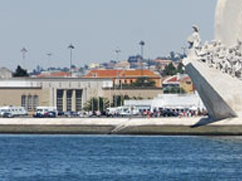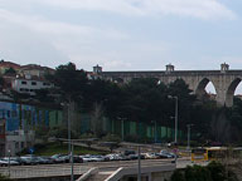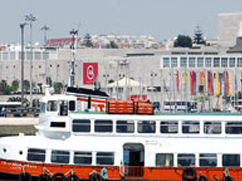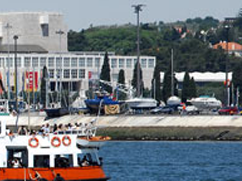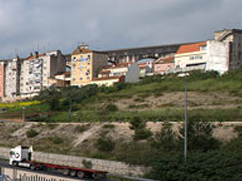Programme
Indicators for territorial policies: closing data gaps by using traditional and new sources and methods
DAY 1 – 29 JUNE
13:30 – 14:15 | Reception of participants
14:15 – 14:30 | Welcome
14:30 – 17:45 | Opening session
Indicators for territorial policies: theoretical considerations and institutional practices
Keynote speech by:
Ubiquitous information and city and regional policies: shortcomings and challenges | Mário Vale, Director of the Centre for Geographical Studies, University of Lisbon
UN-GGIM: Europe – better integration of geospatial information and statistics to support the UN SDG monitoring | Pier-Giorgio Zaccheddu, Technical Leader of UN-GGIM: Europe Working Group on Data Integration and Head of the International Affairs Section of the Geo(spatial) Information Department of BKG - Presentation
16:00 – 16:15 | Coffee break
Statistics on cities, towns and suburbs supporting urban policies | Gunter Schäfer, Head of the Regional Statistics and Geographical Information Unit, Eurostat - Presentation
DAY 2 – 30 JUNE
9:00 – 10:15 | Session 1: Delimitation of relevant territorial units: size, function and comparability
Discussant: Dev Virdee, Official Statistics Adviser, United Kingdom
Indicators for territorial policies: closing “gaps of understanding” in territorial comparisons | Klaus Trutzel, Bureau for Statistics and Urban Research of the City of Nuremberg, Germany -
Abstract![]() ,
Paper
,
Paper![]() ,
Presentation
,
Presentation![]()
Gravitation and dispersion − a disaggregate view on urban agglomeration and sprawl in Germany | Rüdiger Budde and Uwe Neumann, RWI, Germany -
Abstract![]() , Paper
, Paper![]() ,
Presentation
,
Presentation![]()
Labour Market Areas for territorial policies: potentials for a European approach | Luisa Franconi, Sandro Cruciani, Michele D'Alò and Daniela Ichim, ISTAT - Italian National Statistical Institute -
Abstract![]() ,
Presentation
,
Presentation![]()
Labour Market Areas: the Portuguese case | Elsa Soares and Rossano Figueiredo, Statistics Portugal
-
Abstract![]() ,
Presentation
,
Presentation![]()
10:15 – 10:30 | Coffee break
10:30 – 12:00 | Session 2: Measuring inclusive growth and living conditions at regional level
Discussant: Duarte Rodrigues, Member of the Board of the Portuguese Cohesion and Development Agency
The way to NUTS 2 regional estimates in the Portuguese EU-SILC survey | Eduarda Góis, Statistics
Portugal -
Abstract![]() ,
Presentation
,
Presentation![]()
FILOSOFI, a new administrative source on disposable income and poverty at a local level in France | Luc Brière, INSEE, Regional Action and Dissemination Directorate,
France -
Abstract![]() ,
Presentation
,
Presentation![]()
Making inclusive growth happen in cities and regions | Eric Gonnard, OECD -
Abstract![]() ,
Presentation
,
Presentation![]()
Is life in your region getting better? Measuring progress in Australia’s regions | Adi Smith, Darren Wheatley and Miyoko Asai, Australian Government Department of Infrastructure and Regional Development -
Abstract![]()
Social and spatial disparities in cities − the flip side of urban productivity growth | Rupert Kawka, Federal Institute for Research on Building, Urban Affairs and Spatial Development, Germany -
Abstract![]() ,
Paper
,
Paper![]() ,
Presentation
,
Presentation![]()
12:00 – 14:00 | Lunch at the Holiday Inn Hotel (offered by Statistics Portugal) and Group Photo
14:00 – 15:00 | Session 3: Integrating statistical and geospatial information to produce new territorial indicators
Discussant: Pier-Giorgio Zaccheddu, Technical Leader of UN-GGIM: Europe Working Group on Data Integration and Head of the International Affairs Section of the Geo(spatial) Information Department of BKG
Identification of specific areas within provincial capital cities and their functional areas in terms of the demographic and economic situation of their inhabitants using GIS-based spatial analysis | Adam Dąbrowski, Sylwia Filas-Przybył and Dawid Pawlikowski, Central Statistical Office, Poland -
Abstract![]() ,
Paper
,
Paper![]() ,
Presentation
,
Presentation![]()
SIOU − How to integrate statistical and geospatial data using administrative data on construction works | Cristina Neves and Fátima Moreira, Statistics
Portugal -
Abstract![]() ,
Presentation
,
Presentation![]()
Deriving territorial indicators based on the integration of geospatial and statistical data – challenges and opportunities | Inês Fontes and Cátia Nunes, Statistics
Portugal -
Abstract![]() ,
Presentation
,
Presentation![]()
15:00 – 16:45 | Session 4: Closing data gaps to enhance territorial indicators
Discussant: Oliver Heiden, Administrator of the COTER − Commission at the Committee of the Regions
Measuring territorial cohesion | Eduardo Medeiros, Institute of Geography and Spatial Planning and Centre for Geographical Studies, University of Lisbon,
Portugal -
Abstract![]() ,
Paper
,
Paper![]()
Conceptual diagram for the elderly: an analytical methodology for the visualization of complex problems with territorial cluster application| Ana Alexandrino Silva, Sofia Marques and Rui Antunes, Portuguese Cohesion and Development Agency
-
Abstract![]() ,
Paper
,
Paper![]() ,
Presentation
,
Presentation![]()
Challenges and constraints measuring and monitoring Population Health of European regions | Cláudia Costa1, Iwa Stefanik1, Ângela Freitas1 and Paula Santana1 2, 1Centre of Studies on Geography and Spatial Planning, University of Coimbra, 2Department of Geography and Tourism, University of
Coimbra, Portugal -
Abstract![]()
Population estimates according to Urban Areas Typology: from the relevance of production to the dissemination of new statistical information | Cátia Nunes and Joana Malta, Statistics
Portugal -
Abstract![]() ,
Presentation
,
Presentation![]()
Administrative data and regional statistics on enterprises | André Sousa, António Luís Afonso, Carla Melo and Cecília Silva, Statistics
Portugal -
Abstract![]() ,
Paper
,
Paper![]() ,
Presentation
,
Presentation![]()
Improvement of business statistics from territorial perspective | Iurie Mocanu and Lilian Galer, National Bureau for Statistics, Republic of
Moldova -
Abstract![]() ,
Presentation
,
Presentation![]()
16:45 – 17:00 | Coffee break
17:00 – 18:30 | Session 5: Statistical indicators for regional policy monitor
Discussant: Giovanni A. Barbieri, Presidency Staff, Statistics Italy
The contribution of regions to national economic growth and well-being: presentation of the OECD report "Regions at a Glance" | Eric Gonnard, OECD
- Abstract![]() ,
Presentation
,
Presentation![]()
Public statistics for programming and monitoring cohesion policy - Polish experience with the STRATEG system | Dominika Rogalińska, Central Statistical Office, Poland
- Abstract![]() ,
Paper
,
Paper![]() ,
Presentation
,
Presentation![]()
Changing regional and city policy in the UK and the implications for statistics | Richard Prothero, Office for National Statistics, United Kingdom
- Abstract![]() ,
Paper
,
Paper![]() ,
Presentation
,
Presentation![]()
Use of statistical data in the elaboration of the North Regional Development Strategy | Igor Malai1 and Maria Prisacari2, 1Ministry of Regional Development and Construction, 2North Regional Development Agency, Republic of
Moldova - Abstract![]() ,
Paper
,
Paper![]() ,
Presentation
,
Presentation![]()
Local statistics as a tool for Lisbon Economy and Innovation Strategy | Nuno Caleia Rodrigues, Lisbon Municipality, Portugal
- Abstract![]() ,
Presentation
,
Presentation![]()
DAY 3 – 1 JULY
9:00 – 10:15 | Session 6: Space transformation, land use and value
Discussant: Gunter Schäfer, Head of the Regional Statistics and Geographical Information Unit, Eurostat
House price statistics for small areas − using admin data to give new insights | Bill South, Office for National Statistics, United Kingdom
-Abstract![]() , Paper
, Paper![]() ,
Presentation
,
Presentation![]()
Rent analysis beyond conditional expectation − how to estimate the spatial distribution of quoted rents by using geographically weighted regression | Anne Seehase, Department of Statistics, Magdeburg, Germany
- Abstract![]() ,
Paper
,
Paper![]() ,
Presentation
,
Presentation![]()
Multi-source approach for enhanced Land cover and land use statistics: a pilot study in Portugal | Diana Almeida1, Filipe Marcelino2, Francisco Gutierres3, Pedro Campos1, Francisco Vala1 and Mário Caetano2, 1Statistics Portugal, 2Directorate-General for Territory, Portugal, 3Eurecat − Technology Centre of Catalonia, Big Data Analytics Unit, Spain (formerly in Statistics Portugal)
- Abstract![]() ,
Paper
,
Paper![]() ,
Presentation
,
Presentation![]()
Environmental quality of urban areas: a cross-cutting approach to measure smart factors and eco-sustainability | Giovanni A. Barbieri and Alessandra Ferrara, ISTAT - Italian National Statistical Institute
- Abstract![]() ,
Presentation
,
Presentation![]()
10:15 – 11:15 | Session 7: The potential of open data and big data for territorial information
Discussant: Teodora Brandmüller, Chair of SCORUS, Team Leader of Regional and Urban Indicators, Eurostat
The Use of Spatial Big Data to Support Territorial Policies | Donghan Kim, Korea Research Institute for Human Settlements
- Abstract![]()
Big data in Statistics on Passengers Transport − a case study on Lisbon Metropolitan Area | Rute Cruz Calheiros and Porfírio Leitão, Statistics
Portugal - Abstract![]() , Presentation
, Presentation![]()
From physical to digital spaces: exploring time-space mobility through a telegeomonitoring approach | Margarida Queirós, Paulo Morgado, Nelson Mileu, Fábio Rodrigues, Nuno Marques da Costa, Júlia Guerreiro and Mário Vale, Institute of Geography and Spatial Planning, University of Lisbon,
Portugal - Abstract![]() ,
Presentation
,
Presentation![]()
11:15 – 11:30 | Coffee break
11:30 – 13:00 | Roundtable with experts on regional policies and statistics
Territorial indicators and regional policy monitoring: challenges ahead for official statistics
Moderator: Helena Cordeiro, Vice-President of Statistics Portugal
Participants:
Oliver Heiden, Administrator of the COTER − Commission at the Committee of the Regions
Duarte Rodrigues, Member of the Board of the Portuguese Cohesion and Development Agency
Joaquim Oliveira Martins, Head of the Regional Development Policy Division, OECD
Teodora Brandmüller, Chair of SCORUS, Team Leader of Regional and Urban Indicators, Eurostat
13:00 – 13:15 | Closing session
Maria Manuel Leitão Marques, Portuguese Minister of the Presidency and of Administrative Modernisation
-
Closing Statement![]()











